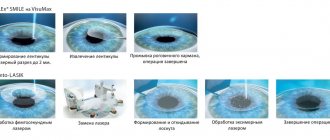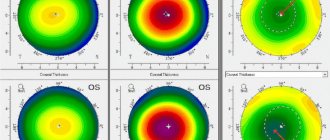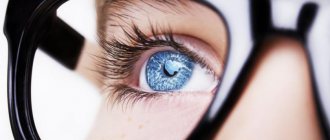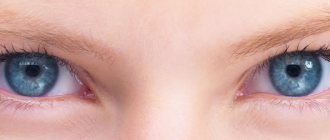Laser correction is a safe and highly effective method of vision restoration. Every year, more than three million operations are performed around the world to get rid of wearing glasses. People are no longer wary of this kind of intervention, seeing their effectiveness. Unfortunately, this method of vision correction is not suitable for everyone.
Laser vision correction is a set of techniques, the indications and contraindications for which depend on the age and health of the patient. The principle of laser vision correction is to correct the cornea and create optimal conditions so that the refracted beam of light is focused directly on the retina. When exposed to the cornea, the laser evaporates its thinnest layer, so before surgery, patients must undergo a full ophthalmological examination, which allows them to obtain accurate data on the state of the visual system. If all indications are normal, you can choose your preferred date for the procedure, and then forget about myopia, astigmatism and farsightedness for many years.
Indications for laser vision correction
Who is recommended for laser correction? For those who do not tolerate vision correction with contact lenses and glasses, people with myopia and farsightedness who lead an active lifestyle. The operation is especially effective for patients with severe astigmatism, a large difference in the amount of myopia or farsightedness between the eyes. It is recommended to get rid of glasses and contact lenses for people whose refractive errors prevent them from fully performing their professional duties: firefighters, police officers, military personnel, those who work with small parts and hazardous substances.
Diagnosis before surgery:
- refractometry for a narrow and wide pupil;
- biometry of the eye to determine its length and the size of intraocular structures;
- tonometry - measurement of intraocular pressure;
- visometry is a method that determines visual acuity;
- wavefront analysis aimed at studying higher order aberrations;
- examination of the fundus - this examination may reveal dangerous retinal tears that prevent the procedure from being carried out at this stage;
- keratometry - determination of the curvature of the cornea and its topography.
After the diagnosis, the doctor chooses the optimal method.
Thus, Lasik laser vision correction is indicated for patients with low and moderate myopia, in the absence of retinal pathologies, and the LASEK procedure is selected by a specialist if the patient has a high degree of myopia, a thin cornea, or there are dystrophic changes in the retina.
Unfortunately, in addition to the indications, there are also contraindications for laser vision correction.
Types of operations and their costs
Laser vision correction can be performed using the following techniques:
- Photorefractive keratectomy. PRK is considered one of the first techniques used to restore vision using a laser. Today, such a procedure is performed extremely rarely, since it is quite traumatic and after execution there is a high risk of clouding the corneal layer. At the same time, such laser correction is considered a fairly cheap method and does not require highly qualified specialists.
- LASEK. This procedure is a modification of PRK and has been performed since 1999. It is considered a real salvation for patients with keratoconus, thinning of the cornea and dry eye syndrome. The method is more traumatic than LASIK and may be accompanied by pain.
- LASIK. The main difference between this method and PRK is the use of both an excimer laser and a microkeratome during the operation. The method is characterized by less trauma and a quick rehabilitation period. Thanks to this method, it is possible to perform the intervention on both eyes simultaneously.
- Femto LASIK. The procedure is identical to the LASIK method, but the formation of a corneal flap is carried out using a femtolaser.
- Super LASIK. Today this technique is considered the most widespread and in demand. Already 1-2 hours after surgery, the patient can examine surrounding objects, and the risk of developing any complications is minimal.
- Epi LASIK. This technique is a type of LASIK and is designed specifically for thin corneas. The method is not used so often and is usually used in cases where other methods of vision correction are not suitable for the patient.
- SMILE. This technology involves restoring vision using a femtosecond laser. During the operation, a lenticule of the corneal layer is formed internally and is removed through an incision. However, using this method it is possible to cope with only minor myopia.
On average, LASIK surgery costs 30,000 rubles per eye, provided that the patient has a low degree of myopia without astigmatism. With a higher degree of myopia, the cost of correction increases by approximately 10-20%, and in the presence of astigmatism, by another 20-30%
The average price for correction using the Super LASIK method reaches 40,000 rubles, and Femto LASIK - 55,000 rubles. Femto Super LASIK is considered the most expensive, and the price of treatment reaches 60,000 rubles. Under compulsory medical insurance, the price for correction may be lower, which is determined by the regulations of the medical institution.
What are the contraindications to laser vision correction?
Restrictions that prevent the procedure from being carried out can be absolute or relative. Relative contraindications to laser vision correction are temporary obstacles that can be eliminated. Thus, temporary restrictions include inflammatory diseases of the eyelids, cornea and conjunctiva in the acute stage. Among the absolute contraindications:
- age up to 18 years - the limitation is due to the fact that the organs of vision continue to grow, their structure changes, so the method cannot guarantee a sustainable result;
- pregnancy and lactation;
- epilepsy, mental disorders and some systemic diseases;
- pronounced nystagmus of the eyeball, cataracts, glaucoma, keratoconus;
- diagnosed retinal detachment;
- diabetes mellitus, presence of a pacemaker;
- thin cornea - in this case it is possible to correct vision using the Femto-Lasik method;
- dry eye syndrome - after surgery, unpleasant symptoms may intensify.
Laser vision correction for women—what are the contraindications to surgery?
Absolutely, this kind of intervention cannot be carried out during pregnancy and lactation. After completing breastfeeding, at least six months must pass.
Only after this can you contact an ophthalmologist for a full diagnosis. During this period, women's hormonal levels change, which can negatively affect healing.
What other contraindications exist? For example, poor vision with severe myopia - above 10.0 - 12.0 diopters - can also become an obstacle to surgery, because with such data, laser correction will not be able to restore vision to optimal levels so that the patient takes off his glasses. That is, even after the operation you will have to wear them. In this case, patients are recommended alternative routes. For example, implantation of an intraocular lens. Surgery cannot be performed if a person has only one eye.
Postoperative period
After laser correction, the patient remains in the clinic for one to two hours. The doctor conducts a follow-up examination to make sure that the upper layers of the cornea are in the correct position. You will be able to return home immediately after the examination.
About laser coagulation of the retina - cauterization of the retina when it is detached, read the link.
There is no hospitalization for laser vision correction, but you will need to come in regularly for examinations - 1, 3, 17, 14 days and 1.3 months after the intervention.
The doctor will prescribe antibiotic drops, which will need to be instilled several times in both eyes over several days. You cannot prescribe gels, drops and ointments on your own.
After surgery, many patients experience increased lacrimation, but do not rub your eyes, and simply blot the tears with a napkin or clean handkerchief.
In the first days after surgery, you can take painkillers if necessary. You need to sleep on your back at least on the first day after correction. Do not wash your hair for 2-3 days (otherwise the shampoo may get into your eyes), do not visit baths, saunas, or swimming pools for at least one month. Physical activity associated with increased injury and heavy lifting should also be avoided. If possible, refrain from using decorative cosmetics and hairspray.
Eye drops for dry eyes
Congenital visual impairments, namely microphthalmos, are described in this article.
Okulohel eye drops with instructions for use and indications are presented here.
What contraindications to laser vision correction can be eliminated?
One of the temporary limitations to laser vision correction is the rapid progression of myopia and hypermetropia - in this case, it will be necessary to undergo a therapeutic course prescribed by an ophthalmologist. Once the process has stabilized, you can begin preparing for laser vision correction. The same applies to various ailments such as conjunctivitis, blepharitis, stye - they can only delay surgery for a while.
If retinal pathologies were identified during diagnosis, the operation should be postponed. Dystrophic changes, depending on the condition, may become a temporary obstacle to the procedure.
In this case, the patient is recommended a laser coagulation procedure, which prevents the progression of the disease and strengthens the retina. Once the patient's condition has stabilized, laser vision correction can be considered.
Limitations and contraindications after laser vision correction
Are there any contraindications after laser vision correction? Yes, there is, although the recovery period is short. Already a month after the operation, you can resume fitness classes and perform physical exercises. During the first week of rehabilitation, it is recommended to wear sunglasses to prevent bright ultraviolet rays from affecting the cornea. The restrictions also include the use of digital technology with screens: smartphones, tablets, laptops.
Particular care should be taken during morning and evening washing. You should not visit the sauna, swimming pool, or use cosmetics.
A calm lifestyle in the first week after laser vision correction is the key to rapid healing.
Sometimes the doctor recommends that patients drip an anti-inflammatory drug into their eyes for several days. In the future, for people who have undergone this kind of intervention, there are no restrictions regarding physical activity.
Can laser correction negatively affect visual acuity?
The main concerns of patients who decide to undergo surgery are distrust of the technology. Many are afraid that the lights will be turned off during manipulations, and without equipment the doctor will not be able to complete the correction process. That the specialist will miss, and the laser will not be able to accurately create the profile of the cornea, and this will lead to loss of vision or a significant decrease in its acuity.
Fortunately, thanks to the use of precise modern equipment, the human factor is minimized, and if there are interruptions in the power supply to the equipment, electricity generators are used.
During the procedure, the eyes are fixed with a special vacuum ring, and the head is fixed with a vacuum pillow, so no displacements will occur. But a person who chooses laser correction will soon appreciate all the benefits of living with maximum visual acuity.
Method Definition
The essence of laser vision correction is the effect of a cold laser beam on the cornea - it evaporates a thin layer of it and changes the curvature . As a result, the angle of refraction of light in the eye is corrected, the focusing point moves directly to the retina, and the patient begins to see objects clearly.
The main tool of an ophthalmologist microsurgeon is a cold laser beam.
Laser correction allows you to correct any vision defects, completely getting rid of contact lenses and glasses. But the prognosis of the operation may be different - they must be announced by the doctor. The main types of laser vision correction are Lasik (laser keratomileusis), Super Lasik, Femto Lasik, PRK, Lasek. The technique is selected taking into account the patient’s clinical picture, his financial capabilities and the clinic’s equipment.











